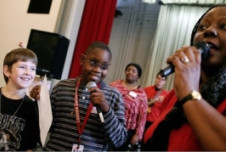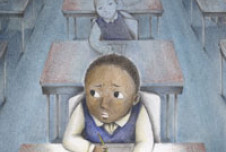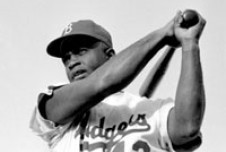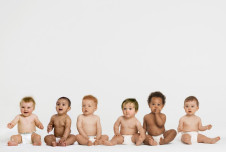Earlier this week I was sitting with my four-year-old son Liko watching teenagers play pick-up basketball in our neighborhood. This is a regular thing with us; Liko loves watching basketball.
"Daddy," he asked thoughtfully, "why do only black kids play basketball?"
My heart skipped a beat and my stomach clenched with anxiety. I looked around the court: In fact, there was one young red-headed white girl and one middle-aged white guy, which I pointed out to him, but otherwise, yes, all the other players were black kids. (For the record, I should note that I'm white and my son is a mix of Caucasian and Asian ethnicities.)
Liko has grown up in a city, riding public transportation and visiting all parts of the Bay Area, and he's accustomed to seeing people of many different races. But this was the first time he'd ever seemed to notice race and the first time he'd ever asked about it.
My split-second reaction was to panic. But I also instantly remembered an essay I had just helped edit for Greater Good — "Rubbing Off," by child psychologist Allison Briscoe-Smith, is part of our new special issue on the science of prejudice.
In the issue, we explore new findings that show how our brains seem to be hardwired to notice and react negatively to racial difference–but we go beyond that to also explore strategies for overcoming prejudice.
Briscoe-Smith's essay explains how kids learn about race and how their parents can foster tolerance. It's a terrific article and my personal favorite in the issue: concrete, specific, and useful.
"Do kids even see or notice race?" asks Briscoe-Smith. "The answer is yes, they see and notice racial differences from a very young age, even in infancy." By the age of three, she writes, kids will start sorting themselves into racial groups.
But Briscoe-Smith urges parents to not see their children as instinctive racists: "For children under the age of seven, race—or, rather, physical traits like skin color, language, and hair texture—are just signs that someone is in some way different from themselves, similar to gender or weight. It's not unusual or unhealthy for kids to gravitate toward the familiar so early in life. Kids' views only become prejudiced when they start linking these physical traits to flaws in character or behavior. We adults are the ones who ascribe malice to simply noticing racial differences." She continues:
So in and of itself, recognizing racial difference is not a cause for alarm—quite the opposite, in fact. For years, studies have found that children who recognize these kinds of differences from an early age show a stronger general ability to identify subtle differences between categories like color, shape, and size—which, in turn, has been linked to higher performance on intelligence tests. Researcher Francis Aboud has found that children between the ages of four and seven who show this advanced ability to identify and categorize differences are actually less prejudiced. So parents, rest assured: When children notice and ask about racial differences, it's a normal and healthy stage of development.
Whew. Remembering that lessened my anxiety about tackling Liko's question.
But how to answer him? Briscoe-Smith notes that many well-intentioned parents opt for a policy of silence on the subject of race. "They assume that if they raise their children not to recognize racial differences, they'll prevent them from becoming racist," she writes.
Unfortunately, while parents are saying things like, "Look at the pretty boat!" in an effort to distract their children from the topic at hand, the kids are still noticing race and forming their own ideas on the subject–or getting their ideas from messages in the world around them.
"Instead of trying to ignore race, research suggests that parents should be more pro-active," writes Briscoe-Smith. She continues:
They can tell their kids it's OK to recognize and talk about racial differences while still communicating that it's wrong to hold racial prejudices. My own research with 67 racially- and ethnically-diverse families, all of which had children under the age of seven, indicates that talking and answering kids' questions about race may help them understand racial issues and become more tolerant. I found that the children of parents who talked more about race were better able to identify racism when they saw it, and were also more likely to have positive views about ethnic minorities. This was true for both the white families and the families of color in my study….
So parents, next time you're on a playground and you hear your child say something that seems racially confused or even offensive, don't be embarrassed. Don't scold or shush. And don't end the conversation with, "We don't say things like that." Instead, you might want to try, "Hmm, why don't we talk about that some more?"
Liko looked at me and he expected an answer. I took a deep breath and said, "Well, it looks like a lot of black kids like playing basketball! Do you want to play basketball with them when you're older?"
"Yeah!" he said.
Then he said: "Can I have an ice cream?"
And that was that. (Though I really need to read an article on how to say, "no, you can't have ice cream right now," in a way that doesn't result in wheedling or weeping.) In the moment, I felt somehow inadequate, like I had missed some great opportunity to, I don't know, plant the seed that will result in him one day becoming a perfectly tolerant human being.
But in retrospect, I see that I was just being a stupid adult. He was asking a simple and reasonable question, one of about two hundred he asked me that same day. But it put me on alert: There will be more questions on race in the future, and they may be a lot tougher. I hope I'm up to the job.
[Originally posted to my Mothering magazine blog.]






Comments
Thanks for this nice post. Here are my thoughts on the topic:
Teaching Tolerance
Use and misuse of race in biomedical research.
Enjoy!
Karama Neal | 9:06 am, August 11, 2008 | Link
Great post. I’ve had similar experiences with my 8 year old daughter. And, my initial reactions of panic were similar to yours. But I’ve tried to handle each awkward question from my daughter as an important ‘teaching moment’ as Briscoe-Smith and you suggest. Thanks for sharing this.
Eric Mar | 1:41 pm, December 19, 2008 | Link
So “science” teaches us that “there’s no such thing as race,” but also that we’re “hard-wired” to notice differences in breed among homo sapiens as we do among any other species of mammal. We’re now so “progressive,” however, so morally “evolved,” i.e., so properly conditioned by our moral superiors in academia and its media parrots, that we “panic” when our children are unable to feign the selective blindness to race befitting us mature adults. Not to worry: “science” has once again come to the rescue of egalitarian dogma (whose culturally privileged place is in dire need of explanation). There we learn of an emergent “science of racial bias” to explain (away?) the behavioral as well as the phenotypical racial differences everyone notices but (only historically recently) have been ashamed (even “panicked”!) to admit, differences powerfully explanatory of the bias. Science is the service of cultivated blindness . . . all in the name of “the greater good”!
Anthony Flood | 8:53 am, August 7, 2009 | Link
Hi Anthony. There are some crucial misunderstandings in your comment. Science doesn’t teach us that there is no such thing as race (not sure why you put that in quote marks, since it doesn’t come from the piece here). Racial categories exist because people create them, because we are wired to notice differences in eye, hair, and skin color (and other kinds of differences in our environment). Noticing differences can create a kind of startle effect in the mind–one which fades, and which we can outgrow.
The special anxiety we as Americans feel about race–in this case, questions of race coming from our kids–don’t arise in response to pressure from academia (I doubt most people are aware of something called “academia” in their private moments with kids) but because of a history of slavery, Civil War, Jim Crow, and so on, and the persistent inequalities between (in this case) white and black. Ultimately, it is my decision as a parent to make, whether I will link the differences my son notices to a belief that we should be unequal. I choose to teach him that we are more alike than different under the skin, and that all human beings must find a way to live together in this world. That’s not dogma; it’s a value I hold dear.
Jeremy Adam Smith | 11:42 am, August 7, 2009 | Link